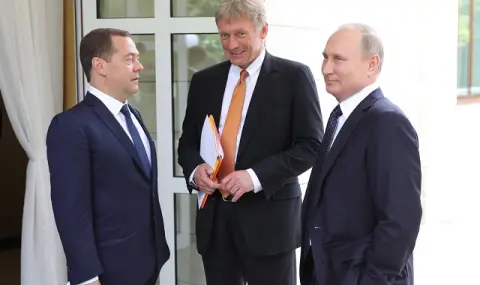The Kremlin is once again stepping up its campaign to control of the West by using nuclear threats and diplomatic manipulation. Former President Dmitry Medvedev is particularly active in threats.
This is stated in the Institute for the Study of War (ISW) daily analysis.
On the other hand, Russian elites and Kremlin officials are vying for influential posts in the Russian government ahead of the May 7 inauguration of incumbent President Vladimir Putin.
The aim is to secure prematurely influential roles in case the Kremlin strongman leaves power at the end of his new term.
On May 6, the Russian opposition publication "Meduza" reported that his Kremlin sources said that Russian elites had begun actively speculating about who would enter the new Russian government after Putin took office, and noted that some elites were "tense," hoping for promotions and worrying about demotions.
Another source close to the Russian government told Meduza that Kremlin officials and the Russian elite are currently trying to take the "highest possible position" in case Putin's upcoming six-year presidential term is the latter because of his age.
ISW has seen no signs that Putin intends to leave power after his upcoming presidential term ends. Therefore, Putin's eventual efforts to position elites to succeed him, and efforts by elites to position themselves in government, are likely premature.
One of the sources said that Russian elites are speculating that Moscow Mayor Sergei Sobyanin or First Deputy Head of the Russian Presidential Administration Sergei Kiriyenko could become the next Russian Prime Minister, while other sources expressed doubt that the current Russian Minister- chairman Mikhail Mishustin will resign.
A source close to the Federal Assembly of Russia told "Meduza" that the deputies of the Russian Duma are now ready to re-approve Mishustin as Prime Minister.
A Russian insider, who has regularly been accurate about previous changes in the Russian military command, claims that the Russian military command has appointed the commanders and chiefs of staff of the newly formed Leningrad and Moscow Military Districts (LVO and MVO).
The Kremlin continues to tighten restrictions on what it calls "foreign agents," limiting their ability to hold government functions, possibly as part of a covert purge of officials who don't align adequately with the Kremlin.
p>Ukraine's General Directorate of Military Intelligence (GUR) conducted a successful maritime drone strike against a Russian patrol boat in occupied Crimea on May 6, and Ukrainian forces are reportedly adapting their maritime drones to counter Russian defense measures.
Russia may switch sides in Sudan's civil war to support the Sudan Armed Forces (SAF) in its bid to establish a naval base in the Red Sea, which would align Iranian and Russian policies on Sudan and create opportunities for enhanced Iranian-Russian cooperation in Sudan and the wider Red Sea region.
Since 2008, Russia has sought a Red Sea port to protect its economic interests in the region and improve its military posture by increasing its ability to challenge the West in the wider region, including in the Mediterranean and The Indian Ocean.
Russia may switch sides in Sudan's civil war to support the Sudan Armed Forces (SAF) in their bid to establish a naval base in the Red Sea, which would align Iranian and Russian policies on Sudan and create opportunities for enhanced Iranian-Russian cooperation in Sudan and the wider Red Sea region.
Since 2008, Russia has sought a Red Sea port to protect its economic interests in the region and improve its military posture by increasing its ability to challenge the West in the wider region, including the Mediterranean and The Indian Ocean.
Russia's support for the Sudanese military will be of great benefit to Iran as it will align Iranian and Russian policy and strategy in the region, which will further Iran's own goals of securing a Red Sea base in Sudan.
In addition, the Kremlin is pursuing secondary goals, including displacing Ukrainian and American influence in Sudan, through its ties to the local military.
Recently, Russian forces confirmed their advance northwest of Svatovo, near Avdeevka, in western Zaporozhye Oblast and on the eastern (left) bank of Kherson Oblast.
The head of Ukraine's Zaporozhye region, Ivan Fedorov, said that Russian authorities have created the necessary infrastructure to call up Ukrainians in the occupied Zaporozhye region and plan to call up more than 150,000 Ukrainians into the Russian army in an unspecified period of time.
